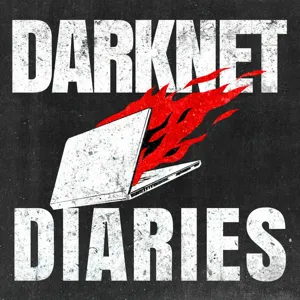Podcast Summary
Operation Aurora: How Well-Crafted Phishing Emails Led to Cyber Attacks on Top Tech Companies: Cybersecurity is crucial, and even the best security measures may not be enough to prevent cyber attacks. Companies must remain vigilant and take necessary steps to mitigate the risks posed by cybercriminals.
Companies like Google, Adobe, Yahoo, and Microsoft were victims of Operation Aurora, a sophisticated cyber attack that involved hackers sending well-crafted phishing emails to employees. The hackers got through by creating emails that looked like they had come from a coworker and containing links that led to malware-infected websites. Although the browser patch prevented it from being effective, it was just a cover for the real hack where the malware gave the hackers full access to the system. This incident shows that even with the best security measures in place, it's still not impossible for cybercriminals to infiltrate a company's network. Cybersecurity is crucial, and companies must remain vigilant to mitigate the risks posed by cybercriminals.
Cybersecurity Threats and Advanced Techniques Used in Google Attack: The Google attack during the holidays utilized sophisticated methods to bypass antivirus software, control victims' computers, and target court-ordered Gmail accounts. This raises concerns about government espionage and highlights the evolving threat landscape for businesses.
Hackers used highly sophisticated and rare techniques to attack Google during the Christmas and New Year holidays, targeting Chinese human rights activists' Gmail accounts. The attack included a newly created Trojan that bypassed all antivirus software and enabled hackers to control the victim's computer. Additionally, the hackers were after court-ordered Gmail accounts, which is baffling and has led to many theories about whether it was some form of government espionage or a way to check how much government can see into Gmail accounts. This cybersecurity threat changed the threat landscape for commercial companies, and its advanced methods and techniques have been seen previously in attacks on banking industries and utility companies by governments.
Ensuring Source Code Security with Configuration Management Systems: Companies should rely on reliable and secure software configuration management systems to safeguard their source code as cyber attacks are increasingly hard to trace due to anonymity on the internet. It is crucial to maintain security measures to prevent vulnerabilities in such systems.
Companies need to keep their source code in secure locations using software configuration management systems such as Perforce, Concurrent Versions Systems, Microsoft Visual SourceSafe or IBM Rational. However, Perforce was found to have many vulnerabilities such as anyone can create their own user account and the passwords are unencrypted. The Aurora exploit that targeted many companies might have been conducted by a team of dozens of people. The attack might have been done to gather information for a bigger attack later or to simply let the exploit become known. The attackers were traced back to two schools in China, the Shanghai Jiao Tong University and Lanxiang Vocational School. Cyber-attacks can be difficult to trace because of the anonymity on the internet.
China's Cyber Attack on Google: Espionage or Act of War?: The cyber attack on Google in 2010, believed to be orchestrated by China, highlighted the increasing importance of internet security and censorship issues in the international arena. It also raises questions about the blurred lines between espionage and acts of war in the digital age.
China was likely behind the sophisticated cyber attacks on Google in 2010, as they were trying to prevent Google from allowing Chinese citizens to access information that was censored in China. Google had complied with censorship requirements to enter the Chinese market, but the government continued to demand broader censorship even after the 2008 Olympics. The attack involved malware that was only used in China and originated from two schools in China, indicating that a well-funded group with advanced capabilities was responsible. While some news outlets called it an act of war, it was seen by others as espionage because it involved theft of information. The incident highlighted the importance of internet security and censorship issues in the international sphere.
Google's Conscience vs. Chinese Censorship Laws: Google's decision to shut down its Chinese website due to censorship laws shows that sometimes doing what is right is more important than pursuing profit and that protecting one's network from cyber attacks is critical.
Google shut down its google.cn website and closed most of their offices in China after they realized that by complying with Chinese censorship laws, they were being evil and helping the country conduct their oppression. This was a huge decision for Google, as China has the most population of any country in the world, and Google is the most popular website in the world. Even though leaving such a large market impacted Google's revenue and traffic, they quit their fight over Chinese censorship laws. Baidu is now the major search engine in China, and since Operation Aurora attack, Google and other companies had to step up their defenses to protect their networks from sophisticated attacks.
The Elderwood Group: A Masterful and Mysterious Hacking Group: Elderwood Group is a skilled and secretive hacking group that uses zero-day exploits to target high-profile companies. They focus on gaining access to defense companies and cover their tracks exceptionally well.
The Elderwood hacking group is a highly skilled and elusive group that has been involved in numerous hacking campaigns targeting big companies like Google, Microsoft and Adobe. They are known for their use of zero-day exploits, which are not that common in the hacker scene. The group seems to be interested primarily in gaining access to defense companies and their supply chains in order to obtain valuable information on military technology, and they are incredibly good at covering their tracks. Even though they are difficult to pin down, researchers are constantly monitoring for connections between new breaches and the Elderwood group, and their tactics and objectives continue to evolve over time.
The Advanced Chinese Hacking Group Behind Targeted Attacks in the West: The Elderwood Group, suspected to be a large, well-funded, and highly organized hacking group, uses zero-day exploits to gain access to bigger companies through smaller third-party contractors. Cyber-attack diplomacy is necessary to combat such growing cyber threats.
The Elderwood Group, a highly trained and advanced hacking group from China, has been targeting defense contractors, human rights organizations and other companies in the West for years. The group uses zero-day exploits to infect the websites of third-party contractors and non-profit organizations to gain access to their systems, implant malware into software and eventually make its way into bigger companies. The Elderwood Group is suspected to have hundreds, if not thousands, of members working in different teams with different tasks. They are well-funded and highly organized. Researchers believe that the group has broken up into smaller groups to avoid being connected and continue their hacking activity. Cyber-attack diplomacy is needed to stop these growing cyber threats.
US-China Cyber Agreement: A Hollow Victory?: While governments pledge to cease theft of intellectual property, commercial hacking remains the norm. Companies must remain vigilant, particularly those supplying contractors in the defense sector.
The US and Chinese government have reached a common understanding to not engage in cyber-enabled theft of intellectual property for commercial gain. However, this agreement may not hold much value as both countries continue to gather details from each other through hacking commercial companies. This makes it difficult to understand governments as they keep zero-day exploits just for themselves. Governments hacking into other governments or companies in other countries is now the new normal. This is the current battlefront that is secret and hidden from all of us until something goes wrong or gets sloppy or until someone wants us to see something. Companies, especially those that supply to defense contractors, should take this as a cautionary tale to be more vigilant.



